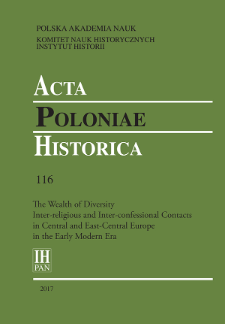
Obiekt
Tytuł: Auto-da-fe in Lwów in 1728: The Jan Filipowicz Trial and Jewish Re-Conversion to Judaism in the Early Modern Poland
Inny tytuł:
Acta Poloniae Historica T. 116 (2017) ; The Wealth of Diversity Inter-religious and Inter-confessional Contacts in Central and East-Central Europe in the Early Modern Era
Współtwórca:
Orla-Bukowska, Annamaria : Tł. ; Martin, Sean : Red. ; Instytut Historii Polskiej Akademii Nauk ; Komitet Nauk Historycznych Polskiej Akademii Nauk
Wydawca:
Instytut Historii Polskiej Akademii Nauk
Miejsce wydania:
Opis:
Typ obiektu:
Abstrakt:
This article discusses the question of neophytes’ return to Judaism, especially the case of Jan Filipowicz, who was condemned to death for this crime in 1728 in Lwów. The return of Jewish converts to their religion of origin was a relatively frequent occurrence in the Polish-Lithuanian Commonwealth, but those charged with this crime, especially Jews from Lwów accused of persuading the neophytes to return, were not usually treated as harshly as Filipowicz. The exceptionally harsh sentence given to the rabbis responsible for the return of Filipowicz to Judaism resulted from the judges’ belief in the existence of a ritual of dechristianization, a special blasphemy against Christianity. The relationship of the courts and the Church in the Polish-Lithuanian Commonwealth to the problem of apostasy among converts from Judaism is addressed. The penitential practices described in the court documents are similar to those described by the inquisitor Bernard Gui in the fourteenth century and to the ritual of dechristianization described by Jan Serafinowicz, the most famous eighteenth century convert.
Bibliografia:
Fram Edward, ‘Perception and Reception of Repentant Apostates in Medieval Ashkenaz and Pre-modern Poland’, Association for Jewish Studies Review, xxi, 2 (1996), 299–339.
Goldberg Jakub, ‘Żydowscy konwertyci w społeczeństwie staropolskim’, in Anna Izydorczyk and Andrzej Wyczański (eds.), Społeczeństwo staropolskie, iv (Warszawa, 1986), 195–248.
Gui Bernard, Practica inquisitionis heretice pravitatis, ed. by Célestin Douais (Paris, 1886).
Hundert Gershon D., Jews in Poland-Lithuania in the Eighteenth Century: A Genealogy of Modernity (Berkeley, 2004).
Kanarfogel Ephraim, ‘Changing attitudes towards apostates in tosafist literature, late twelfth-early thirteenth-centuries’, in Elisheva Carlebach and Jacob J. Schacter (eds.), New Perspectives on Jewish-Christian Relations (Leiden, 2011), 297–327.
Katz Jacob, Exclusiveness and Tolerance (Oxford, 1961).
Kaźmierczyk Adam, Rodziłem się Żydem … Konwersje Żydów Rzeczypospolitej XVII–XVIII w. (Kraków, 2015).
Maciejko Paweł, Mixed Multitude: Jacob Frank and the Frankist Movement, 1755–1816 (Philadelphia, 2011).
Bernard, ‘Apostasy in the Late Middle Ages in Ashkenazic Jewry’, Dine Israel, x–xi (1984), 43–79.
Shatzmiller Joseph, ‘Converts and Judaizers in the Early Fourteenth Century’, The Harvard Theological Review, lxxiv (1981), 63–77.
Utterback Kristine T., ‘“Conversi” Revert: Voluntary and Forced Return to Judaism in the Early Fourteenth Century’, Church History, lxiv, 1 (1995), 16–28.
Yerushalmi Yosef Hayim, ‘The Inquisition and the Jews of France in the Time of Bernard Gui’, The Harvard Theological Review, lxiii, 3 (1970), 317–76.
Czasopismo/Seria/cykl:
Tom:
Strona pocz.:
Strona końc.:
Szczegółowy typ zasobu:
Format:
Identyfikator zasobu:
oai:rcin.org.pl:68567 ; 0001-6829 ; 10.12775/APH.2017.116.05
Źródło:
IH PAN, sygn. A.295/116 Podr. ; IH PAN, sygn. A.296/116 ; kliknij tutaj, żeby przejść
Język:
Prawa:
Licencja Creative Commons Uznanie autorstwa-Użycie niekomercyjne-Bez utworów zależnych 4.0
Zasady wykorzystania:
Zasób chroniony prawem autorskim. [CC BY-ND 4.0 Międzynarodowe] Korzystanie dozwolone zgodnie z licencją Creative Commons Uznanie autorstwa-Bez utworów zależnych 4.0, której pełne postanowienia dostępne są pod adresem: ; -
Digitalizacja:
Instytut Historii Polskiej Akademii Nauk
Lokalizacja oryginału:
Biblioteka Instytutu Historii PAN
Dofinansowane ze środków:
Dostęp:
Kolekcje, do których przypisany jest obiekt:
- Repozytorium Cyfrowe Instytutów Naukowych > Kolekcje Partnerów > Instytut Historii PAN > Czasopisma
- Repozytorium Cyfrowe Instytutów Naukowych > Kolekcje Partnerów > Instytut Historii PAN > Wydawnictwa Instytutu
- Repozytorium Cyfrowe Instytutów Naukowych > Kolekcje Partnerów > Instytut Historii PAN > Wydawnictwa Instytutu > Czasopisma
- Repozytorium Cyfrowe Instytutów Naukowych > Kolekcje Partnerów > Instytut Historii PAN > Wydawnictwa Instytutu > Czasopisma > Acta Poloniae Historica
- Repozytorium Cyfrowe Instytutów Naukowych > Piśmiennictwo > Czasopisma/Artykuły
Data ostatniej modyfikacji:
22 wrz 2023
Data dodania obiektu:
18 lut 2019
Liczba pobrań / odtworzeń:
488
Wszystkie dostępne wersje tego obiektu:
https://rcin.org.pl/publication/85771
Wyświetl opis w formacie RDF:
Wyświetl opis w formacie RDFa:
Wyświetl opis w formacie OAI-PMH:
Obiekty Podobne
Salmonowicz, Stanisław (1931–2022)
Wijaczka, Jacek (1960– )
Wijaczka, Jacek (1960– )
Bogucka, Maria (1929–2020)

 INSTYTUT ARCHEOLOGII I ETNOLOGII POLSKIEJ AKADEMII NAUK
INSTYTUT ARCHEOLOGII I ETNOLOGII POLSKIEJ AKADEMII NAUK
 INSTYTUT BADAŃ LITERACKICH POLSKIEJ AKADEMII NAUK
INSTYTUT BADAŃ LITERACKICH POLSKIEJ AKADEMII NAUK
 INSTYTUT BADAWCZY LEŚNICTWA
INSTYTUT BADAWCZY LEŚNICTWA
 INSTYTUT BIOLOGII DOŚWIADCZALNEJ IM. MARCELEGO NENCKIEGO POLSKIEJ AKADEMII NAUK
INSTYTUT BIOLOGII DOŚWIADCZALNEJ IM. MARCELEGO NENCKIEGO POLSKIEJ AKADEMII NAUK
 INSTYTUT BIOLOGII SSAKÓW POLSKIEJ AKADEMII NAUK
INSTYTUT BIOLOGII SSAKÓW POLSKIEJ AKADEMII NAUK
 INSTYTUT CHEMII FIZYCZNEJ PAN
INSTYTUT CHEMII FIZYCZNEJ PAN
 INSTYTUT CHEMII ORGANICZNEJ PAN
INSTYTUT CHEMII ORGANICZNEJ PAN
 INSTYTUT FILOZOFII I SOCJOLOGII PAN
INSTYTUT FILOZOFII I SOCJOLOGII PAN
 INSTYTUT GEOGRAFII I PRZESTRZENNEGO ZAGOSPODAROWANIA PAN
INSTYTUT GEOGRAFII I PRZESTRZENNEGO ZAGOSPODAROWANIA PAN
 INSTYTUT HISTORII im. TADEUSZA MANTEUFFLA POLSKIEJ AKADEMII NAUK
INSTYTUT HISTORII im. TADEUSZA MANTEUFFLA POLSKIEJ AKADEMII NAUK
 INSTYTUT JĘZYKA POLSKIEGO POLSKIEJ AKADEMII NAUK
INSTYTUT JĘZYKA POLSKIEGO POLSKIEJ AKADEMII NAUK
 INSTYTUT MATEMATYCZNY PAN
INSTYTUT MATEMATYCZNY PAN
 INSTYTUT MEDYCYNY DOŚWIADCZALNEJ I KLINICZNEJ IM.MIROSŁAWA MOSSAKOWSKIEGO POLSKIEJ AKADEMII NAUK
INSTYTUT MEDYCYNY DOŚWIADCZALNEJ I KLINICZNEJ IM.MIROSŁAWA MOSSAKOWSKIEGO POLSKIEJ AKADEMII NAUK
 INSTYTUT PODSTAWOWYCH PROBLEMÓW TECHNIKI PAN
INSTYTUT PODSTAWOWYCH PROBLEMÓW TECHNIKI PAN
 INSTYTUT SLAWISTYKI PAN
INSTYTUT SLAWISTYKI PAN
 SIEĆ BADAWCZA ŁUKASIEWICZ - INSTYTUT TECHNOLOGII MATERIAŁÓW ELEKTRONICZNYCH
SIEĆ BADAWCZA ŁUKASIEWICZ - INSTYTUT TECHNOLOGII MATERIAŁÓW ELEKTRONICZNYCH
 MUZEUM I INSTYTUT ZOOLOGII POLSKIEJ AKADEMII NAUK
MUZEUM I INSTYTUT ZOOLOGII POLSKIEJ AKADEMII NAUK
 INSTYTUT BADAŃ SYSTEMOWYCH PAN
INSTYTUT BADAŃ SYSTEMOWYCH PAN
 INSTYTUT BOTANIKI IM. WŁADYSŁAWA SZAFERA POLSKIEJ AKADEMII NAUK
INSTYTUT BOTANIKI IM. WŁADYSŁAWA SZAFERA POLSKIEJ AKADEMII NAUK


































